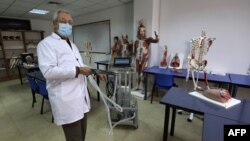A Palestinian university on Thursday unveiled a "home-made" ventilator as West Bank hospitals brace for a potential wave of coronavirus patients.
The device was released by Al-Quds University on the outskirts of Jerusalem a day after being certified for use in Palestinian hospitals.
Hani Abdeen, dean of the university's medicine faculty, said that earlier this year, the occupied Palestinian territories (including the West Bank, Gaza and East Jerusalem) had only had 180-200 ventilators.
With the West Bank alone home to some 2.7 million people, far more machines will likely be needed if a major COVID-19 outbreak takes hold.
But as global demand spikes amid the pandemic, importing large numbers would have been difficult and costly — so university engineers designed their own.
Some parts were near-impossible to obtain but the designers improvised, Abdeen said.
"Of course there was this problem 'where are you going to find the parts needed for this ventilator in order to produce it in large numbers?'" he said.
"But we were fortunate enough to find [them] in the Palestinian market."
The pump-action ventilator is less versatile that some of the larger ones on the market, but fast to make, at a fraction of the cost of advanced models.
The engineers aim to produce 500 of the ventilators for local hospitals in the coming days.
So far the need is relatively limited — there have been only around 350 confirmed cases of the disease in the West Bank and Gaza, with two deaths.
Strict lockdown measures have been imposed by the Palestinian government.
Neighboring Israel has had a much larger outbreak, with more than 14,000 cases.
Imad Abu Kishek, president of the university, said the engineers were already starting to discuss ways to export the ventilators.
"We are now in a hurry to produce for our hospitals in Palestine, and later on we [will try] to produce more machines for the whole world," he said.
Abdeen said the difficult political situation for Palestinians, with Israel occupying the West Bank and controlling all its borders, had helped spur innovation.
"This proves the perennial fact that under duress you excel," he said.
"We have to rely on the knowledge, the expertise and the innovative ability of Palestinian intellectuals, scientists and medics in order to help our community."







